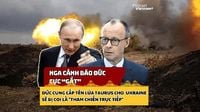In a stark warning to Germany, Russia has asserted that any potential transfer of German-supplied Taurus missiles to Ukraine would be viewed as Berlin's direct involvement in the ongoing conflict. This statement comes amid rising tensions as Germany's incoming Prime Minister Friedrich Merz expressed readiness to supply Ukraine with long-range cruise missiles capable of striking deep within Russian territory.
Maria Zakharova, the spokesperson for the Russian Foreign Ministry, emphasized that Moscow would consider any attack by Ukraine on Russian targets using these missiles as a provocative act by Germany. "The firing of these cruise missiles is impossible without the direct support of German soldiers," Zakharova stated during a press briefing. She added that any strike on Russian infrastructure would be seen as Germany's direct participation in military operations.
The Taurus missiles, which have a range of 500 kilometers, could potentially enable Ukraine to target critical locations deep inside Russia, including vital supply routes. Merz, who is set to assume office soon, indicated that such military support could help Ukraine disrupt the crucial land link between Russia and Crimea, likely referring to the strategically important Crimean Bridge.
Current Chancellor Olaf Scholz has previously declined to provide these missiles to Ukraine, expressing concern that such actions could escalate the conflict further. Nevertheless, Merz's comments suggest a shift in Germany's approach to military assistance for Ukraine, which has been under scrutiny as the war drags on.
Zakharova's comments reflect a broader pattern of Russian rhetoric aimed at deterring Western military support for Ukraine. Russian Ambassador to Germany, Sergey Nechaev, echoed these sentiments, warning that while the transfer of Taurus missiles would not change the battlefield dynamics, it could lead to an escalation that would compel Moscow to respond with retaliatory measures.
As these developments unfold, international diplomatic efforts continue to address the conflict. France is reportedly facilitating a series of high-level meetings aimed at de-escalating tensions surrounding Ukraine. Meanwhile, U.S. Secretary of State Antony Blinken has been in communication with Russian Foreign Minister Sergey Lavrov, reinforcing the need for dialogue amidst rising hostilities.
In a related context, Iran has reiterated the importance of the International Atomic Energy Agency (IAEA) in ongoing nuclear negotiations, signaling a commitment to diplomatic channels in managing international security concerns. Additionally, South Korea, the United States, and Japan are enhancing their naval cooperation in response to regional security threats, further complicating the geopolitical landscape.
On another front, the Russian Supreme Court has temporarily lifted a ban on the Taliban, indicating a potential shift in Russia's approach to the group amid its complex relationship with Afghanistan. Meanwhile, the UK has successfully tested a new weapon designed to target unmanned aerial vehicles, showcasing advancements in military technology that could impact future conflicts.
As the situation continues to evolve, the international community remains watchful of how these developments will shape the future of the conflict in Ukraine and broader geopolitical dynamics. The interplay between military support, diplomatic negotiations, and regional security initiatives will be crucial in determining the outcome of this ongoing crisis.





